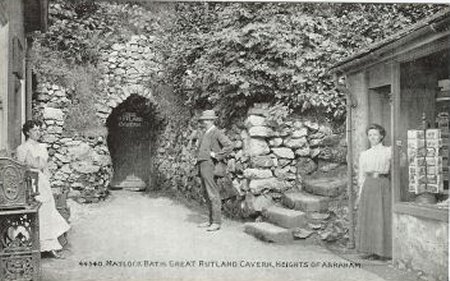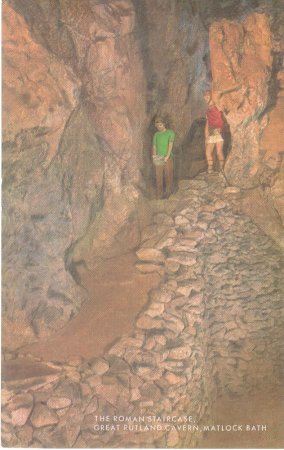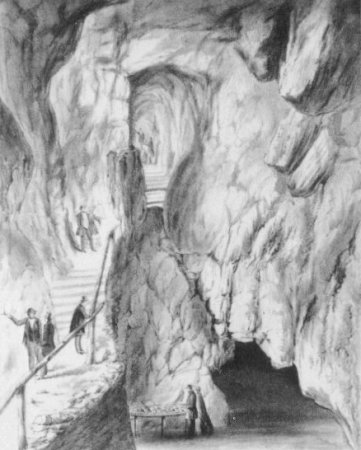Posted pre-1918


Engraving from 1850

Great Rutland Cavern,
Matlock Bath
The Rutland Cavern, which is situated on the Heights of Abraham, claims
pre-eminence over all the others for the extent of its natural
excavations and the beauty of its mineral decoration. It
is said to have been worked as a lead mine as far back
as the period of the Roman occupation, and it is recorded
that during the reigns of some of the Plantagenet kings
convicts were condemned to labour in it. A narrow
passage leads from the entrance beneath a succession of
archways, with openings leading off in different directions
to openings and cavities that ramify and extend into the
heart of the mountain. Huge cracks and openings reveal
themselves here and there in the roof, and occasionally a
cavern is entered where the walls are incrusted with
crystallisations of calcareous spar, that reflects the lights and
gleam and sparkle with dazzling scintillations, reminding
the spectator of the lines:-
[here are 7 lines of fashionable poetry replete with
classical allusions, which I cannot force myself to
transcribe, but a scan of which may be obtained from the
webmaster on request - Ed]
Matlock Bath
- [here are 7 lines of fashionable poetry replete with
classical allusions, which I cannot force myself to
transcribe, but a scan of which may be obtained from the
webmaster on request - Ed]
A succesion of vaulted passages leads to an immense
natural cavity in the further recesses of the rock, which
has received the name of the Roman Gallery, and the not
less fanciful name of the Druid's Altar has been given
to a huge block of limestone, that appears to have fallen
from the superincumbent mass. Upon the "altar" the
guide usually places a chemical preparation which, when
lighted, illuminates the whole place, and casts a weird-like
glare upon every projecting crag and inequality. The
cavern is now lighted with gas.
from "Illustrated Guide to Matlock" by John Heywood 1910.
Dates:
Photo taken:
Size:
Source:
Click on photo for enlargement (on CD only)
Have any more information about this photo?
Please e-mail the author on:

